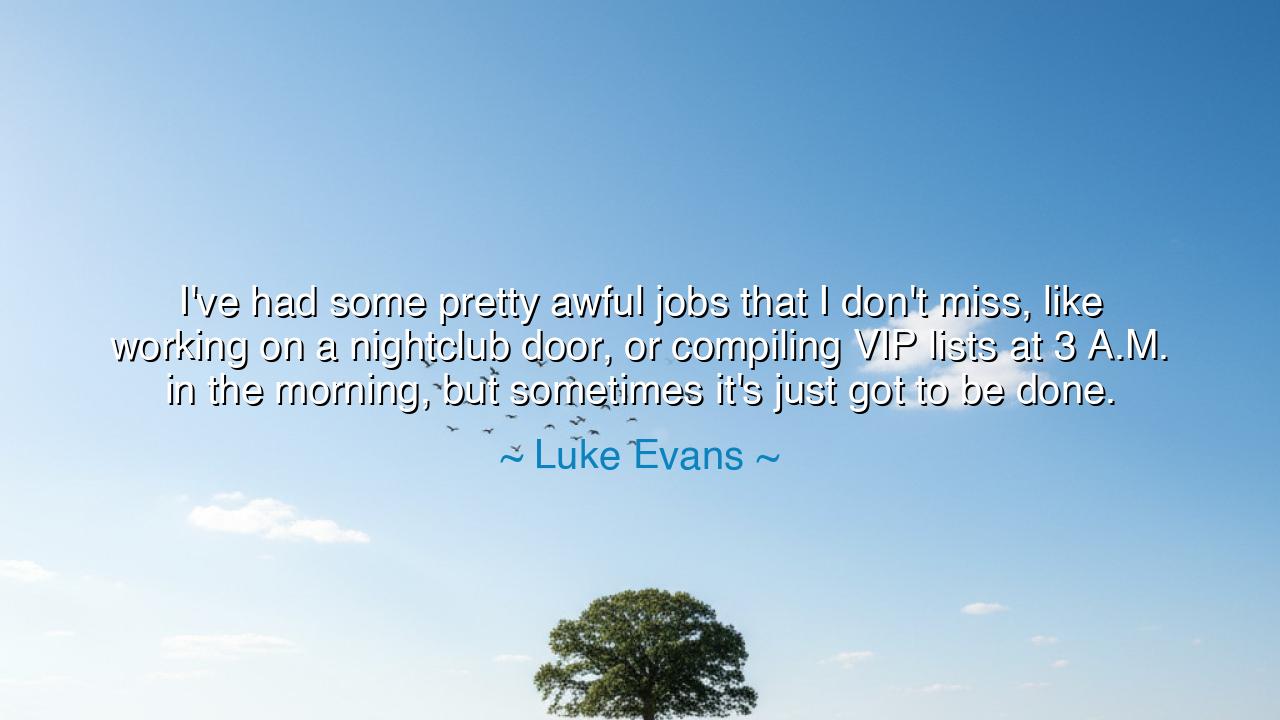
I've had some pretty awful jobs that I don't miss, like working
I've had some pretty awful jobs that I don't miss, like working on a nightclub door, or compiling VIP lists at 3 A.M. in the morning, but sometimes it's just got to be done.






"I've had some pretty awful jobs that I don't miss, like working on a nightclub door, or compiling VIP lists at 3 A.M. in the morning, but sometimes it's just got to be done." With these words, Luke Evans brings forth a universal truth about the human condition: the inevitability of hard work, especially in moments when the task at hand may seem grueling or undesirable. His reflection on the challenges of certain jobs speaks to the reality that, in life, we are often called upon to perform tasks that may not align with our desires but are necessary for our growth and survival. It is in these moments of discomfort and self-sacrifice that true character is tested and formed.
In the ancient world, labor—whether intellectual, artistic, or manual—was revered, but it was also recognized as a necessity. The Romans had a saying: "Labor omnia vincit," which translates to "work conquers all." The sentiment behind this was not that work itself was glorious, but that through work, even the hardest challenges could be overcome. Many of the great figures of antiquity, such as Cincinnatus, a Roman statesman and general, knew the importance of humble work. Cincinnatus, though a respected leader, spent much of his life farming and living in simplicity. When the state called upon him in times of need, he put aside his personal comforts for the greater good. Similarly, Evans’ experience with less-than-ideal jobs is a reminder that sometimes, work must be done not for its glory, but for its necessity.
The story of Heracles in Greek mythology provides another example. Despite being a demi-god, Heracles was forced to perform the Twelve Labors—tasks that were often painful, degrading, and seemingly impossible. Yet, through each labor, he gained strength, wisdom, and the respect of the gods. In this, there is a lesson: that the hardest tasks, though unpleasant, are often the ones that lead to the greatest growth. Similarly, in modern life, the seemingly awful jobs—like working late hours, handling difficult tasks, or managing situations that don’t align with our passions—are part of the journey. Evans speaks not of the enjoyment of those tasks but of the reality that they are part of the road to success.
In the **life of Socrates, we find a similar theme. While he was revered as a philosopher, Socrates did not shy away from humble tasks in his everyday life. He often went to the marketplace, lived simply, and did not exempt himself from the hard work that came with his intellectual pursuits. Socrates’ life demonstrates that even the greatest thinkers do not stand above the grind of daily life, and in fact, it is the very discipline of doing the unglamorous work that shapes their character. Like Evans, Socrates understood that self-growth comes not from avoiding work but from accepting and performing the tasks that must be done, no matter how unpleasant.
In more modern times, we see entrepreneurs like Steve Jobs who, despite their ultimate success, began their careers in humble circumstances. Jobs famously started Apple in his garage, working tirelessly on a project that had no guarantee of success. His early days were filled with tedious work—phone calls to suppliers, assembling parts, and handling the small details that many would consider beneath them. But it was through these grinding tasks that Jobs learned the value of perseverance and attention to detail, skills that would later serve him in building one of the most successful companies in the world.
The lesson in Evans’ words is clear: no task is beneath us if it leads to growth. The most challenging moments, the jobs we may feel are beneath us, are often the very ones that build our resilience and character. Life will not always present us with opportunities that align with our desires, but it is how we respond to those moments—how we handle the unpleasant, the grueling, and the difficult—that shapes who we become. The greatness of a person is not measured by the ease of their life but by their ability to endure and rise above the challenges they face.
As we navigate our own lives, let us remember that hard work is often the key to growth and success. Whether we are tackling small tasks or facing monumental challenges, it is through our willingness to put in the effort, even when it feels difficult or unpleasant, that we carve our own path forward. Like Evans, we may face jobs we don’t love, but it is in doing those tasks with dedication that we prepare ourselves for the greater opportunities that lie ahead. So let us embrace the hard work, knowing that it is through effort and perseverance that we unlock our potential and prepare for the future.






AAdministratorAdministrator
Welcome, honored guests. Please leave a comment, we will respond soon